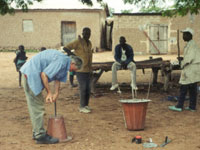
Grades 7 - 12, College, Adult
Directed by Martin Harbury
Produced by Martin Harbury & Catherine Swing
DVD Purchase $79, Rent $45
US Release Date: 2002
Copyright Date: 2002
DVD ISBN: 1-59458-602-0
VHS ISBN: 1-56029-974-6
Subjects
African Studies
Agriculture
Anthropology
Appropriate Technology
Developing World
Energy
Health
Humanities
Local Economies
Science
Technology
Society
Sustainable Agriculture
Technology
Awards and Festivals
The Chris Award, Columbus International Film & Video Festival
Best Documentary, Orinda Film Festival
Honorable Mention, EarthVision Environmental Film Festival
Visual Anthropology Film/Video Festival, American Anthropoligical Association Conference
Hot Springs Documentary Film Festival
Hazel Wolf Environmental Film Festival
World Community Film Festival
A hand-operated peanut-sheller makes a difference in the lives of villagers around the world.
 |
"A great story...It should be required viewing for high public office." Tim Williams, Senior Research Scientist, College of Agricultural & Environmental Sciences, University of Georgia |
PEANUTS shows a living example of the difference that one person, with good will and determination, can make in the lives of countless others.
When film technician Jock Brandis discovered cotton being grown in traditionally food-bearing fields in a village in southern Mali, he decided to do something about it.
He observed to villagers that growing cotton would rob their soil of nitrogen, and suggested they plant peanuts either around the cotton plants or in rotation with cotton. Peanuts have several advantages. They fix nitrogen in the soil; they are more profitable; and they're rich in protein. But the problem, they replied, is husking them by hand.
Jock promised he would return with a machine, but discovered that no small-scale machine exists. So he set about designing one that local people could build on the spot and fix themselves.
The film follows Jock and his set of fiberglass molds back to Mali, where he worked with local villagers to perfect and manufacture their own hand-operated peanut husker. Produced at a material cost of approximately $10, for concrete and steel, each machine is easily capable of husking 100 pounds of peanuts per hour.
Ibrahim Togola, the head of the Mali Folkecenter for Renewable Energy, sees the peanut-sheller as appropriate technology that villagers can master, and use to improve their own communities.
As word spreads about the invention, there are plans for thousands of the machines to be manufactured and used not only in Mali, but across the globe.
Reviews
"A great story, subtly showcasing the many skills that people need for life--problem solving, determination and commitment, human relations, cultural understanding, engineering and manufacturing, economics, and environmental sensitivity while maintaining interest in a simple tale of two 'cities'. I have not yet found a viewer who did not sit glued to this story. It also shows the unappreciated fact that America engages in more than high profile military actions that so dominate the perception of other nations. It should be required viewing for high public office."
"Smart, inspiring, and often humorous...An uplifting film about positive change in contemporary Africa, this is recommended for larger public libraries and African Studies collections."
"The beauty of Peanuts is the power of the documentary genre: taking the camera to a hitherto unexplored part of the human experience and giving attention to a story that deserves to be shared...Harbury's film is a gentle, quiet and sincere effort that approaches its subject with respect and brilliantly pinpoints the universal elements in its most specialized of topics....At a time when the United States is spending billions of dollars to destroy countries with the goal of 'liberating' them, the liberation that Brandis is giving to the villages in Mali (economic self-sufficiency, agricultural protection, healthy food) costs only $10 per peanut sheller. The irony of achieving more with less was never more clear. This film deserves to be seen by the powers in Washington and by foreign ministries and foreign aid organizations around the world--a strong lesson can be found here."
"In addition to the obvious uses in African studies and/or agriculture classes, this video could also be used to stimulate discussions on a variety of topics such as: developing countries, sustainability, health, energy, engineering, appropriate technology. Recommended."
"Jock Brandis...may have achieved 'the holy grail of sustainable agriculture': a low-cost, easy-to-bui